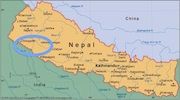The School in Shaktinagar was completed on February 24, 2013!
Shaktinagar Community Profile


Shaktinagar is part of the Magaragadi VDC (Village Development Committee) in the Bardiya District of mid- western Nepal. This community was founded in 2000 when the government freed the Kamaiya (bonded labourers) of Nepal and resettled them in many small villages. Today there are 1,012 people living in Shaktinagar. All of them are Hindu and 99% belong to the Tharu ethnic group. The Tharu make up about 6.5% of Nepal’s total population and were the primary sufferers of Kamaiya before indentured servitude was banned in Nepal.
Shaktinagar is 142 km from the buildOn office in Dhangadhi and 45 km from the district headquarters in Nepalgunj. The leaders of the community are Mr. Sukh Ram Tharu and Mrs. Raj Kumari Chaudhary. There is a government health post in Jayanagar, 4 km from this village. Villagers usually travel there by cart or on foot. The people of Shaktinagar are subsistence farmers. Families grow rice, wheat, oilseed, and vegetables. They also have a nearby forest, Janjagriti Jungle, as a resource. The climate is warm for most of the year, with cooler temperatures from November to January and the heaviest rains from June to August.
Shaktinagar is 142 km from the buildOn office in Dhangadhi and 45 km from the district headquarters in Nepalgunj. The leaders of the community are Mr. Sukh Ram Tharu and Mrs. Raj Kumari Chaudhary. There is a government health post in Jayanagar, 4 km from this village. Villagers usually travel there by cart or on foot. The people of Shaktinagar are subsistence farmers. Families grow rice, wheat, oilseed, and vegetables. They also have a nearby forest, Janjagriti Jungle, as a resource. The climate is warm for most of the year, with cooler temperatures from November to January and the heaviest rains from June to August.
The Old School

There are currently 121 students enrolled in Nawajyoti Primary School - 64 girls and 57 boys. They study with 3 teachers from the community in grades 1-3. This school was formally established just 5 years ago. There are no permanent classrooms in Shaktinagar, so the students study in a mud and wood structure with a thatched roof. These temporary classrooms are easily damaged during the annual monsoon season. Some students walk about 2 km to another community to continue primary school after grade 3.
The Shaktinagar School Project

The Shaktingar school project broke ground on November 4th 2012 and was completed on February 24th 2013. The school in Shaktinagar will have 3 classrooms, 2 latrines as well as desks, seats and permanent chalkboards. The people of Shaktinagar contributed a total of 1,548 volunteer workdays to the project, finishing 22 days behind a typical buildOn Nepal school schedule due to overlap with the harvest season. Before beginning construction they also collected local materials for the project and met with buildOn staff and US Ambassadors to sign a covenant outlining the following responsibilities:
Community Contribution
• Unskilled labor: 20 workers (10 women and 10 men) per day, six days per week
• Commitment to educating girls and boys equally
• The land on which the school will be built
• High quality local materials: sand, gravel, water & rocks
• Volunteer management committee made up of 12 villagers (six women, six men)
• Lodging for buildOn Field Coordinator and skilled laborers in local homes
• Basic construction tools (picks, buckets, etc.) when available
buildOn Contribution
• Engineering and architecture
• Construction materials (excluding local materials) for school and latrine
• Skilled labor and plans needed to build the school
• Project management (buildOn coordinators)
• Instruction in basic construction techniques
• School furniture
Community Contribution
• Unskilled labor: 20 workers (10 women and 10 men) per day, six days per week
• Commitment to educating girls and boys equally
• The land on which the school will be built
• High quality local materials: sand, gravel, water & rocks
• Volunteer management committee made up of 12 villagers (six women, six men)
• Lodging for buildOn Field Coordinator and skilled laborers in local homes
• Basic construction tools (picks, buckets, etc.) when available
buildOn Contribution
• Engineering and architecture
• Construction materials (excluding local materials) for school and latrine
• Skilled labor and plans needed to build the school
• Project management (buildOn coordinators)
• Instruction in basic construction techniques
• School furniture
I could not get the opportunity to go to school during my childhood. So I could not do progress in my life. But I learned that I should manage education facilities for our kids, because every progres depends on quality education.
- Mr. Ram Tharu, leader, age 35
